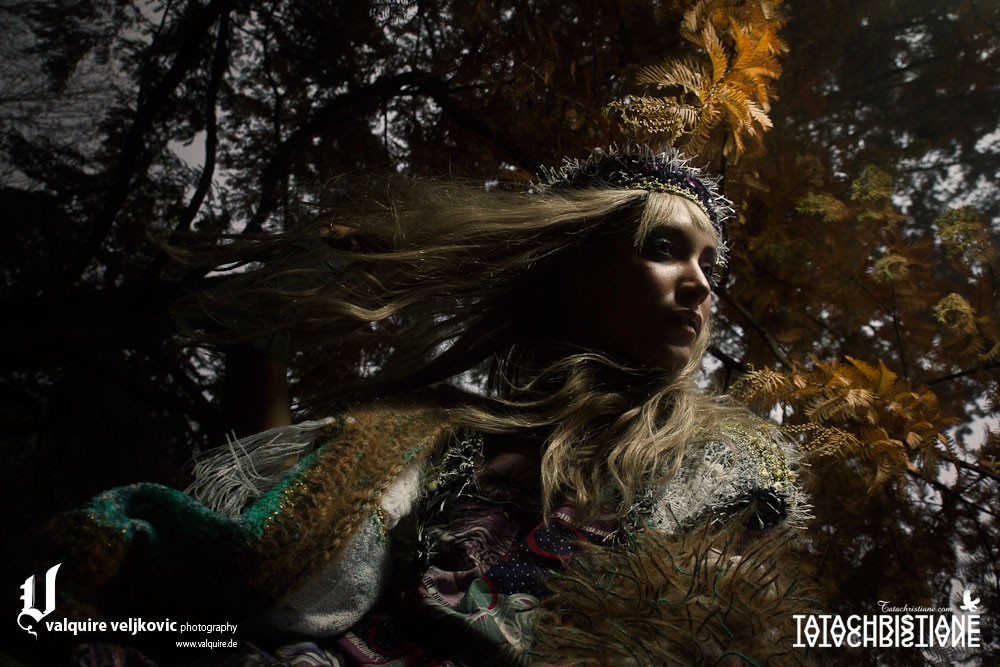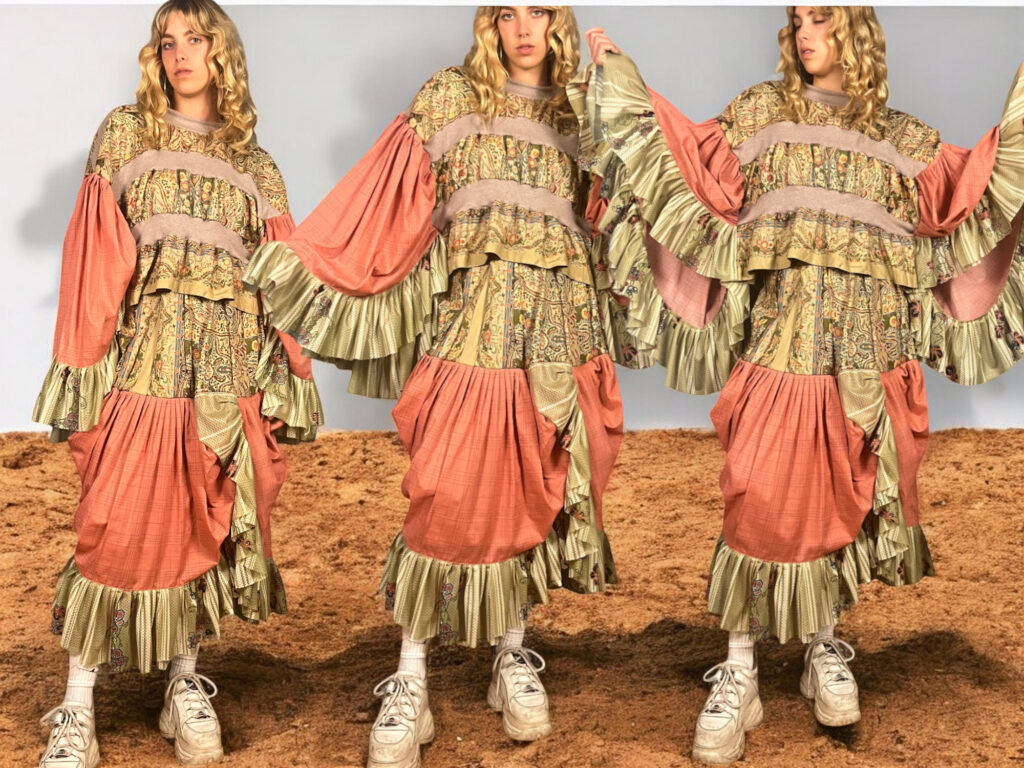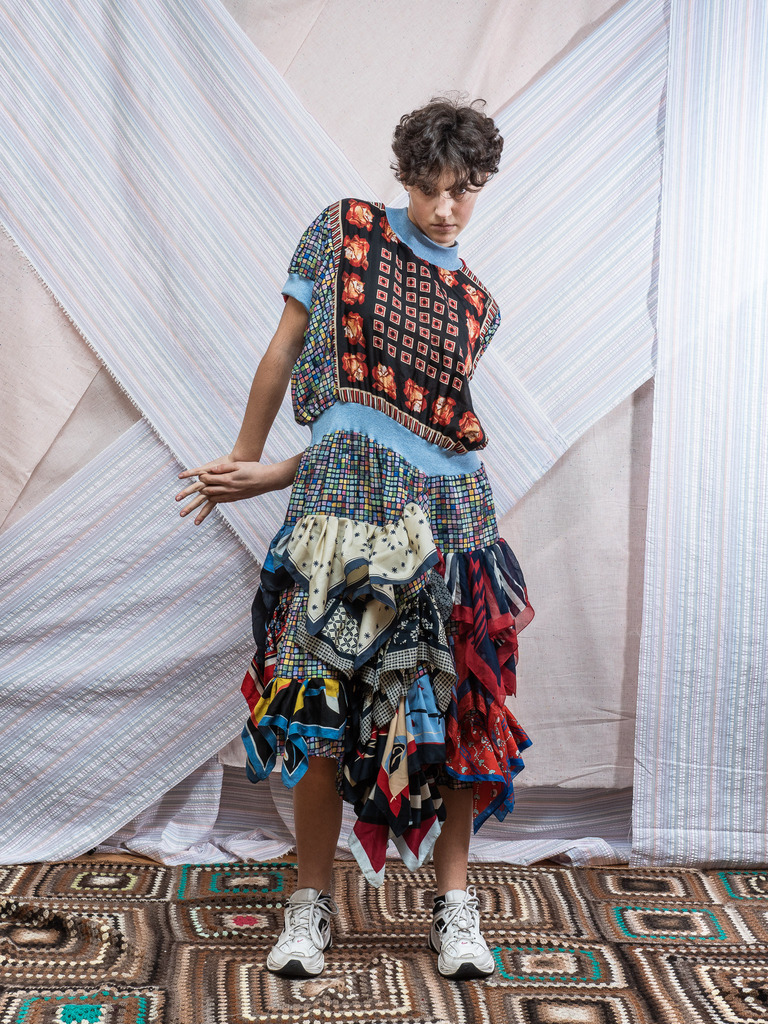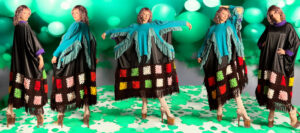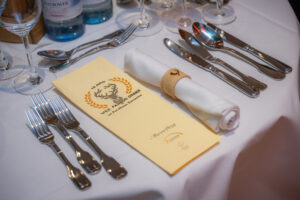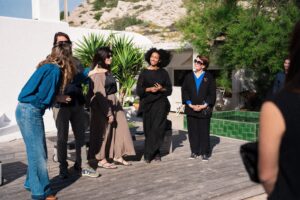Emotional Upcycling by Tata Christiane
Hello everyone,
My name is Julie, and I am the founder of Tata Christiane, an independent label based in Berlin focused on circular fashion, upcycling, and small-scale production. Today, I’d like to share my personal and professional journey—one rooted in sustainable design, logistical ingenuity, and deep creative exploration.
Emotional Upcycling, A Practice Born from a Love of Vintage Clothing
The idea behind Tata Christiane came about organically—almost out of necessity. I’m self-taught, and when I started in 2007, I didn’t yet speak in terms of “sustainability,” though in retrospect, my approach was always fundamentally circular. It was an aesthetic, pragmatic, and intuitive choice.
The brand’s name comes from a key moment in my youth. In the 1990s, as a teenager in Marseille, I dressed exclusively in secondhand pieces sourced from flea markets three times a week. I was a collector, filling my room with vintage clothes and books. I loved the cuts, the fabrics, the hand repairs, and the hidden stories sewn into linings and embroidery.
One day, while thrifting with the sister of my best friend and future label partner, she looked at my finds and said: “It looks like something Tata Christiane would wear!”—referring to her flamboyant great-aunt. In France, everyone has a Tata Christiane, and so do I. That name became our promise: to embrace color, eccentricity, and originality.
Daily Upcycling: Logistical Challenges and Creative Solutions
Working with upcycling means navigating daily constraints—but also limitless potential.
Sourcing is the first challenge: I use deadstock, fabric coupons, and vintage garments and pieces by the kilo. When I started, only street and flea markets offered this type of material. Textile fairs demanded minimums that were unaffordable for a small brand. Even today, sourcing is tricky: no traceability, no composition labels, no guarantees.
Documenting each piece is another major task. Every garment is unique, which means I must photograph, describe, and catalog everything individually. I now rely on tools like Photoroom and ChatGPT to streamline this process.
Retail partnerships can be complicated. Many stores aren’t equipped to work with one-offs or very small runs. This led me to invent new formats: capsule collections, exhibition-sales, and shared boutique spaces. Since August 2024, I’ve been part of RARE, a collaborative store in Berlin co-founded with three other sustainable labels. It’s both a selling space and a site for public engagement.
Customs declarations are another issue: with no clear fabric composition on vintage pieces, international shipping becomes more complex.
Emotional Upcycling as a Source of Creativity and Narrative
Despite the constraints, upcycling is an endless source of inspiration. Because I never know exactly what I’ll find—colors, textures, patterns—my process is always fresh.
I favor zero-waste cutting, using basic geometric shapes like rectangles, squares, bands, and triangles. My fabric waste is now nearly zero, and the small remnants become patchworks or hand-embellished details.
For my basics, I use print-on-demand services in Europe. While the cost is higher, it prevents overproduction. When possible, I choose organic cotton or recycled polyester.
Emotional Upcycling in some exemples : Pilzreliq80, Stranger Threads, and Nature Morte in Antarctic
In Pilzreliq80, I was inspired by bracket fungi—organisms that transform dead wood into life. I used 1980s vintage garments from West Germany and added volume through folded fabric and insertions, all with a zero-waste approach. A metaphor for creative parasitism.
In Stranger Threads, I explored the orphaned threads of my studio: too-small scraps, leftover shapes. Each piece became a textile map—celebrating the accident, the residue, and the invisible. Every garment was a sewn diary as an emotional Upcycling.
With Nature Morte in Antarctic, I translated climate anxiety into an emotional landscape. Antarctica’s vast whiteness and fragility struck me deeply. I used AI tools to visualize my feelings, creating prints that reflect the tension between sublimity and disappearance. Layered silhouettes speak to human vulnerability, echoing historic costume traditions. The project is rooted in the philosophies of Friedrich Schiller and Immanuel Kant—beauty as a moral and emotional elevation. Creating garments is, for me, an aesthetic experience that invites slow contemplation.
In New Traditions, I wanted to explore how inherited cultural gestures and ceremonial codes can be reinterpreted through a contemporary lens. The collection blends the intimacy of domestic heritage with the exuberance of playful self-expression through an emotional Upcycling. Using archive fabrics and repurposed materials, I created silhouettes that embrace both nostalgia and transformation. Each piece is a hybrid—honoring traditional craftsmanship while proposing new rituals. It’s a joyful, colorful invitation to rethink how we carry forward beauty, meaning, and community in the garments we wear.
5. Memory, Education, and Community Workshops
Since the pandemic, I’ve been rebuilding my digital archive with detailed stories behind each collection. For me, memory, pedagogy, and fashion culture are as vital as the clothes themselves.
📖 Read: Insights and Tools for Independent Designers in Germany
I’ve also launched crochet workshops in Berlin, held at my studio in Lichtenberg or the RARE store. The workshops are open to everyone from age 10, using leftover yarn in a welcoming atmosphere. Each participant leaves with a crochet hook and a small ball of wool.
🧶 Join a Workshop
6. Looking Ahead: Collaboration and Creative Autonomy
After a maternity break, I’m slowly returning to full-time work. This aspect of entrepreneurship—especially for women—is often overlooked. It challenges our ability to sustain small businesses.
I move forward with the intent to share knowledge, create meeting points, and support collaboration. The opening of RARE Store in August 2024 is a cornerstone. Along with Fade Out Label, Therapy Upcycle, and Every Days Pieces, we founded it as a sustainable fashion collective beyond traditional retail models.
I also participate in collaborative formats like Reuse Super Store, where we experiment with community-based commerce, proximity, and creative freedom.
Conclusion: A Poetic and Emotional Approach to Sustainable Fashion
Tata Christiane is rooted in storytelling, handcraft, and clothing as emotional artifacts. I believe in emotional garments—pieces that speak, comfort, and inspire.
I advocate for a fashion system that heals, uplifts, and shares alternative narratives. An independent, layered, and human fashion.
read here the interview: https://gettingecological.com/interviews/interview-with-tata-christiane-rejecting-fast-fashion/

